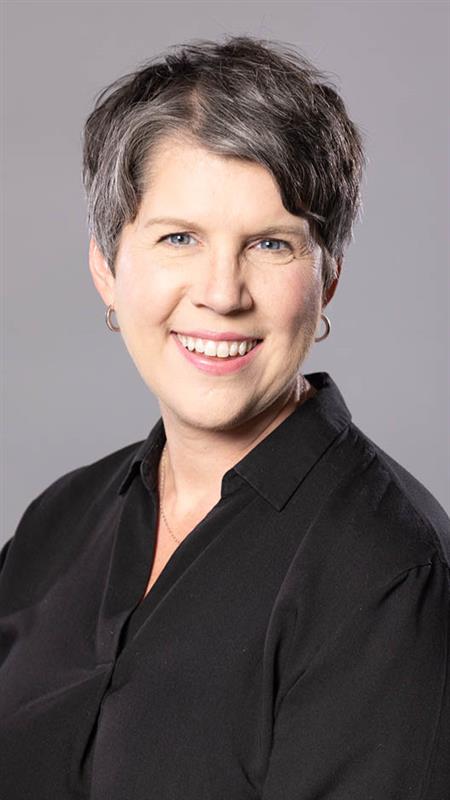
Blending passions for science and communications
A talk with Aimee Christian, COM’s Sandra R. Frazier Professor of Public Relations
Aimee Christian’s career has taken her from Switzerland to Los Angeles to Boston. She’s worked in corporate communications and external affairs as well as scientific operations, straddling the fields of science and communication at major pharmaceutical and agricultural companies including Sanofi, Novartis and Syngenta. It’s a diverse career path driven by curiosity: “In the back of my mind, I’m always thinking, ‘What can I do next?’” she says.
Christian’s latest challenge brings her to COM, where she started as the Sandra R. Frazier Professor of Public Relations in July 2025.
Christian spoke with COMtalk about how she got her start in the sciences and found her way to communications as well as the challenges facing today’s communications students.
Q&A
With Aimee Christian
COMtalk: How did you come to work at the intersection of science and communication?
Aimee Christian: I earned my bachelor’s in zoology from Connecticut College, with the intention of becoming a medical doctor. However, the universe had other plans for me when I ended up at Drexel University studying for a PhD in biochemistry.
While I enjoyed the critical thinking skills that I was learning and the experimental mindset that I was fostering, I still wasn’t sure where my path was going to lead. About halfway through the degree, I realized that life in the lab was probably not going to be my path and I needed to determine where my career was going to go.
During my time in grad school, I actually put together a lunch and learn where I had people from all over the industry give us insight—selfishly, because I wanted to know what was available—as to what we could do if we didn’t want to stay in bench science. From those discussions, I learned about clinical research and roles in the pharmaceutical industry and began to imagine where I could go.
COMtalk: And what did you discover?
Aimee Christian: My first role after grad school was in clinical research. I learned that I loved the people and clinical care aspect, but I also learned that I had a strong need to be creative and there wasn’t a lot of opportunity to exercise that part of my brain in clinical or biochemistry research.
After a couple of years, my husband and I decided to move to California, where I joined a cancer research institute as an intellectual patent portfolio manager. It was a very stressful job, but what I realized was that I was really good at communicating science to non-scientific audiences. I was able to get the lawyers and the businesspeople to understand what the scientists were trying to tell them.
After I left that role, I pivoted into the pharmaceutical industry. And that’s where I stayed for 25 years.
After working at Novartis for a few years, my boss called me one day and said, “Do you want to work in Europe someday?” And I said, “Absolutely.” I threw my hat in the ring for a job based in Switzerland and got it. It was one of the best things I ever could have done.
COMtalk: Why was that?
Aimee Christian: It opened my world, and I got a sense of the global economy and how to work in that type of environment. I started to learn the nuances between language, geography and culture when it came to business strategy and eventually communications. I had the responsibility of communicating to and managing the training curriculum of medical liaisons in 23 countries, who spoke probably 20 different languages. I didn’t realize it at the time, but it was a great training ground for doing what I love, which is communications on a global scale.
COMtalk: How long did you work abroad?
Aimee Christian: I was in Switzerland for about ten years. After I had done that [program development leader] job for about four years, I was looking to see what my next step would be. When they approached me to ask if I wanted to join the pharma comms team, it sounded perfect. After I had been in all of these different jobs, and I had done an inventory of what I liked and what I didn’t like, it always came back to communications. I was drawn to the variety of a global comms role and was challenged every day. I did and still do find that incredibly exciting and very cerebrally enriching.
COMtalk: After going from science to communications, what inspired your move into academia?
Aimee Christian: I belong to the Page Society and, at their annual meeting, I met up with the former chief communication officer at CVS. She had told me about how she pivoted to academia. She offered me a chance to guest lecture in her class, which was fantastic. I loved it. But, also at that meeting, I met Arunima [Krishna], associate professor of mass communication, advertising and public relations at COM]. She asked if I had ever considered teaching. And I had said, “I actually have been talking nonstop at this meeting about how to pivot into academia.” And she told me about the role at BU.
What I find funny is that, in the back of my mind, when I thought about my career journey, it always ended up as professor. And I always thought it’s something I’d do when I got older. When this opportunity came about, I had a little bit of a jarring thought: “Oh my gosh, am I older now? Is this what older is?” And yes, I think it is. It’s the right time, and it is absolutely the right opportunity.
COMtalk: What’s something you’re excited about in your first year at COM?
Aimee Christian: Next semester, I’m going to be teaching International PR. I’m excited because, having lived and worked in Europe for so long, I feel I have a lot of lived experience to share with the COM students. We are also putting together an optional experiential opportunity overseas for spring break starting in March 2026. Accepted students will have an opportunity to explore, firsthand, the nuances of language, culture, and geography in driving communications strategies with curated experiences in key European cities like London or Basel, Switzerland. It feels like a very full-circle moment.
COMtalk: What is a challenge that confronts today’s communications students?
Aimee Christian: It’s such a dynamic field that being a lifelong learner and being endlessly curious about the world around you is key. You can always learn the current dogma of what communication is, but the reason that I have been successful in my career is that I never stop asking questions, and I never think that I’m too old or too good or too smart to learn something new.
This interview has been edited for brevity and clarity.


